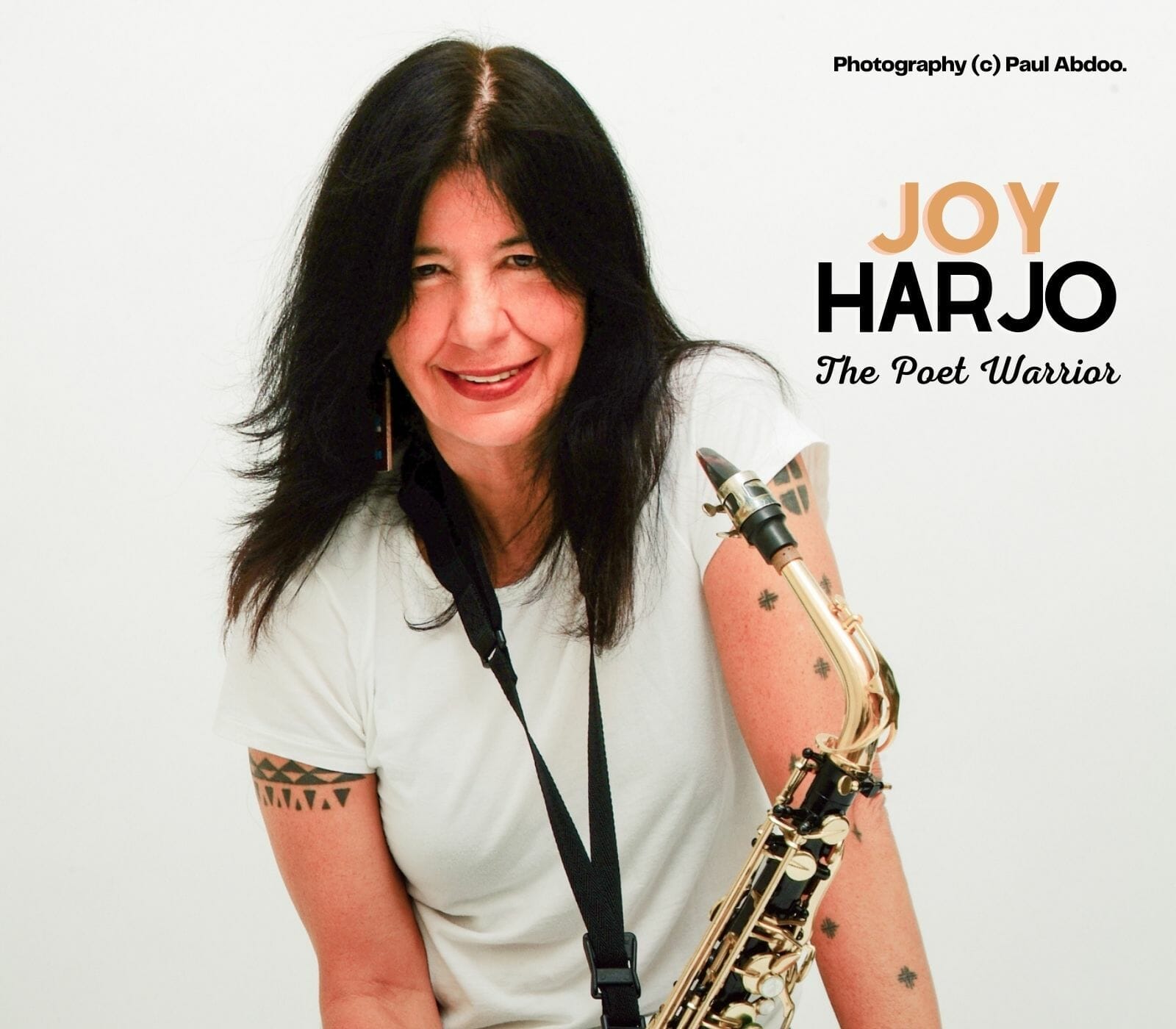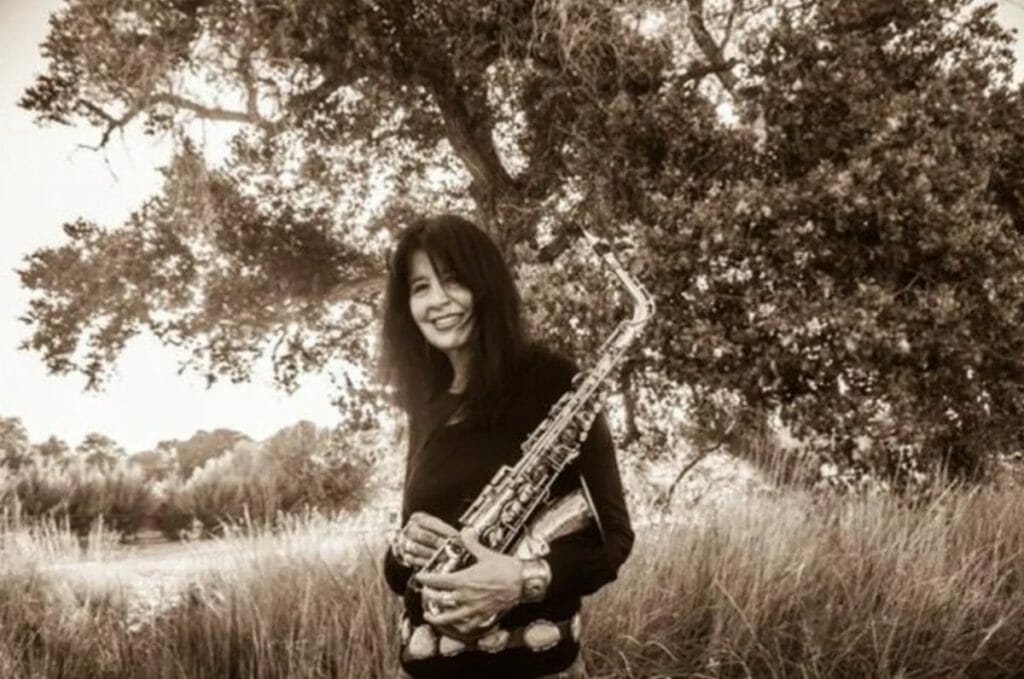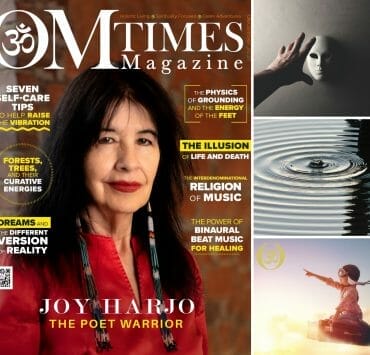Joy Harjo: The Poet Warrior

Joy Harjo is an internationally renowned performer and writer of the Muscogee (Creek) Nation. She is serving her second term as the 23rd Poet Laureate of the United States. Joy Harjo, is a member of the Mvskoke Nation and belongs to Oce Vpofv (Hickory Ground). She is only the second poet to be appointed a third term as U.S. Poet Laureate.
An Interview with Joy Harjo, Poet Warrior
Exclusive Interview by Liane Buck
Born in Tulsa, Oklahoma, she left home to attend high school at the innovative Institute of American Indian Arts, which was then a Bureau of Indian Affairs school. Harjo began writing poetry as a member of the University of New Mexico’s Native student organization, the Kiva Club, in response to Native empowerment movements. She went on to earn her MFA at the Iowa Writers’ Workshop and teach English, Creative Writing, and American Indian Studies at University of California-Los Angeles, University of New Mexico, University of Arizona, Arizona State, University of Illinois, University of Colorado, University of Hawai’i, Institute of American Indian Arts, and University of Tennessee, while performing music and poetry nationally and internationally.
The author of nine books of poetry, including the highly acclaimed An American Sunrise, several plays, and children’s books, and two memoirs, Crazy Brave and Poet Warrior, her many honors include the Ruth Lily Prize for Lifetime Achievement from the Poetry Foundation, the Academy of American Poets Wallace Stevens Award, two NEA fellowships, and a Guggenheim Fellowship. As a musician and performer, Harjo has produced seven award-winning music albums including her newest, I Pray for My Enemies. She is Executive Editor of the anthology When the Light of the World was Subdued, Our Songs Came Through?—?A Norton Anthology of Native Nations Poetry and the editor of Living Nations, Living Words: An Anthology of First Peoples Poetry, the companion anthology to her signature Poet Laureate project. She is a chancellor of the Academy of American Poets, Board of Directors Chair of the Native Arts & Cultures Foundation, and holds a Tulsa Artist Fellowship. She lives in Tulsa, Oklahoma.
OMTimes Had a Pleasure to sit with Joy and discuss her new CD, her poetry, her music, and her art.
“I know I walk in and out of several worlds each day.” ~ Joy Harjo
OMTimes: Your poetry expresses a deep understanding of the delicate relationships in Nature and all its beings. How do you think that your creative words can affect change in the fragile and tumultuous state of our world? How do you balance the gentle nuances between art and activism?
Joy Harjo: There are two questions there. When you consider the oral cultures and written languages of world cultures, poetry is rooted in song, storytelling, and oratory. Words or language create resonance. It’s a living thing. It’s living stuff. When your utterances go out, they’re literally creating a reality, creating a world. And poetry, I think, distills language and meaning more than any other literary art. Music and dance are very closely connected with poetry. What poetry, and writing in general, has taught me is that words do make a difference.
It could be subtle, but there’s an accumulation. Depending on the speaker’s skill or the poet’s skill, words can set off-resonance and energy. Still, as a poet, I question if our words could disarm, literally disarm, weapons. Maybe they can, at a certain level. Perhaps it takes a different kind of time to do so.
OMTimes: You have had so many different and eclectic experiences in your life. You have changed many lives, influenced our modern culture, and built countless bridges across various social divides. Do you consider yourself to be a fearless person?
Joy Harjo: No, I don’t think so. I don’t think anybody, or anyone, is without fear. Fear is a useful tool, I’ve learned. I’ve been writing for 50 years, and I’ve learned that fear has been one of my biggest teachers. Fear is useful. It has a role. It’s good for warning. It’s good for protection. I have noticed that those places marked by fear often become the turning points towards realizing a path or a direction.
I remember being in high school at the Institute of American Indian Arts and choosing our class schedules. I was with my good friend, Belinda Gonzales, who was signing up for theater, and I said to her that I would never get on a stage. The thought of speaking publicly or performing was a place of terror for me. But I ended up participating in one of the first Native drama and dance troupes and learned how being on stage is a way to shift your identity. The stage is really a highly intuitive and psychic space. You can shift your awareness within yourself and perform as someone else. So that one-way fear was a teacher for me.
Another was through music. I loved music and wanted to play saxophone, but the teacher wouldn’t allow girls to play sax. So, I walked away from music. Then, when I was close to 40, I got a saxophone but was terrified. Fear carries a charge. The saxophone, by playing through this fear, became a teacher for me.
I’m not saying you should go into danger, rather, go towards what you love.
“Because Music is a language that lives in the spiritual realms, we can hear it, we can notate it and create it, but we cannot hold it in our hands” ~ Joy Harjo
OMTimes: No, I understand perfectly what you’re saying. I think fear could be a point of expansion. That’s a very interesting thing. I never thought about it that way. Tell us a little bit about your new album “I Pray for My Enemies,” especially the pungent track called “Calling the Spirit Back.” The Calling for a Global (and Personal) Spirit Retrieving. Can you talk a little bit about the process of this creation?
Joy Harjo: I had many incredible teachers. One of my teachers is the Pacific Ocean. We were talking about fear earlier, and when I lived in Hawai’i, the idea of going out in a one-man canoe into the deep used to terrify me. Still, I loved it almost more than anything and learned from it.
I’ve had many incredible teachers along the way. And I would even venture to say spiritual teachers because ultimately, everything is spiritual. But what I’ve learned through those teachers—and some of them are poets, some are healers, some are visionaries—is the importance of ritual. Ultimately, we are all in a ritual together.
The poem, “Calling the Spring Back,” could not have happened without those teachers, those teachings. I guess you would call the poem a kind of soul retrieval. The poem is meant to help us realize these rituals are ongoing and that we can go back. Forgiveness is important. We leave parts of ourselves along the way because of fear or traumatic incidents and judgment—self-judgment, the judgment of others—but we can retrieve these parts of ourselves.
When I write, I don’t always know what I’m writing. I write towards what I don’t understand or towards what I don’t know. And I’m using language because language is like my color, and the lines, the way the poem is set up is, is a kind of architecture. There’s a sense of immense play throughout the whole process. Sometimes I have stories that preface the poems. But many poems come to us in their own time, on their own, without a story. I have noticed that art is often prophecy, and maybe this is one of the primary functions of art.
OMTimes: Once, you said that “poetry is a place you can come when you have no words.” How did you become who you are? Did you have an inspiration?
Joy Harjo: I write a lot about this in my newest Memoir, “Poet Warrior.”
I wanted to be an artist, and I knew I would wind up doing it, but I thought it would primarily be drawing and painting. So I grew up with the paintings of my grandmother, Naomi Harjo, around me. One of my most prized possessions is this painting of my grandmother, Naomi Harjo, made in 1916 of the Seminole Chief Osceola, who never surrendered. He and his people, our people, never surrendered to the US government.
Continue to Page 2 of the Interview with Joy Harjo
OMTimes is the first and only Spiritually Conscious Magazine. Follow Us On Facebook, Twitter, Instagram, Linkedin, Pinterest, and Youtube
Creatrix from Sirius. Fairly Odd Mother of Saints (Bernards). Fish Tank aficionado by day ninja by night. Liane is also the Editor-in-Chief of OMTimes Magazine, Co-Founder of Humanity Healing International and Humanity Healing Network, and a Board Member of Saint Lazarus Relief Fund.






